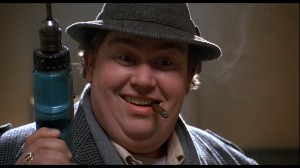Uncle Buck
 “Uncle Buck” (1989) is one of those films that you only appreciate when you get older. I remember seeing it years ago; I thought nothing about it at the time. Now that I’m the same age as Candy’s character (he died tragically young at 44, while Buck was written as a 40-year-old) I can’t help but identify with the protagonist of the film. I like to think my life is a lot more “together” than Buck’s, but it’s the attitude, the tone of the film, that really reaches me.
“Uncle Buck” (1989) is one of those films that you only appreciate when you get older. I remember seeing it years ago; I thought nothing about it at the time. Now that I’m the same age as Candy’s character (he died tragically young at 44, while Buck was written as a 40-year-old) I can’t help but identify with the protagonist of the film. I like to think my life is a lot more “together” than Buck’s, but it’s the attitude, the tone of the film, that really reaches me.
Buck, for all his flaws — a desire to be free from day-to-day work, a weakness for gambling, and his slovenly personal habits — can be defined best as “well meaning.” He’s clumsy, he’s awkward, and he’s often embarrassing, but he WANTS to help. He’s happy to provide assistance where it is required, sensitive to the hurt of others (even though he’s not always quick on the uptake), and willing to set aside his personal issues when the well-being of a loved one is on the line.
As Buck slowly wins over his nieces and nephew, he proves himself an able, if unconventional, parental figure. He is strict about the important stuff, like preventing his eldest niece from getting into trouble with her boyfriend (including public displays of affection with a boy Buck instantly identifies as trouble). He’s easygoing about everything else (perhaps too much so, given the mess this makes). He goes out of his way to make his nephew happy for his birthday. He treats the children like equals, in fact — which, on some mental level, they are, given Buck’s childish streak — until they run afoul of the boundaries, whereupon he makes very clear to them what he will and won’t accept.
The Buck character is really a triumph of confidence and self-esteem. Buck’s an unabashed fat man — a big, loud bull in a china shop who doesn’t care what people think of him. He has no fear whatsoever (except of a day spent behind a desk). He’ll march into the kids’ school to contend with a stuffed-shirt teacher and tell her off as soon as he’s sure of where he stands. He’ll punch a drunken clown in the face without hesitation. He’ll walk into a party full of hostile kids to rescue his niece — and he’s not afraid to employ power tools and physical intimidation toward that goal.
Most of the people in “Uncle Buck” are afraid of Buck, in fact, which is unusual because he’s fat. He’s a comic character and supposed to be amusing. A large component of that amusement is the slapstick physical comedy of him blundering around in his over-sized way; we do not afford to fat people any regard for their ability to hurt us. Yet there is also an acknowledgment, among Buck’s fellow characters (and never spoken explicitly to the viewer) that Buck is not a man to be trifled with. The only people who get the better of him are people who are no threat, for whom he becomes the butt of jokes.
The movie, ultimately, conveys an upbeat message. It tells us that there are people in our lives who are not perfect — emotionally, physically, and even mentally — who, if they mean well and if they have courage, will always come through for us when it counts. John Candy’s early death was a great loss to film and to comedy. Movies like these make you miss him all the more.

